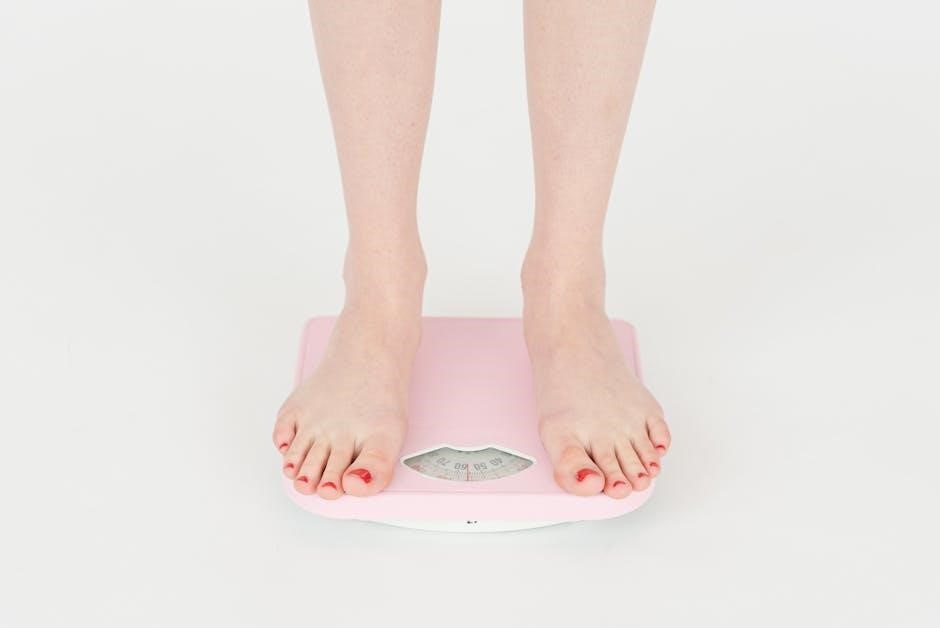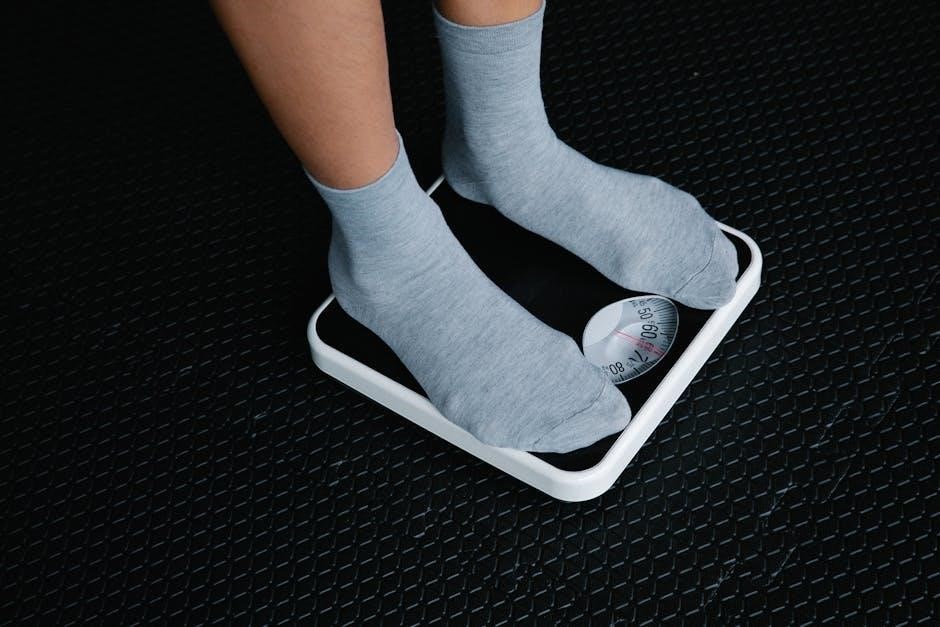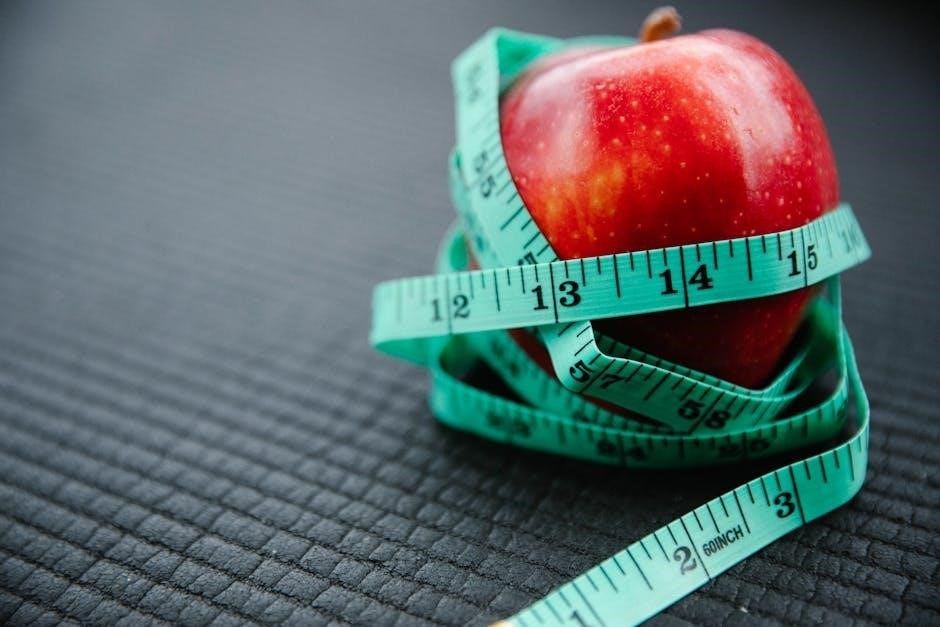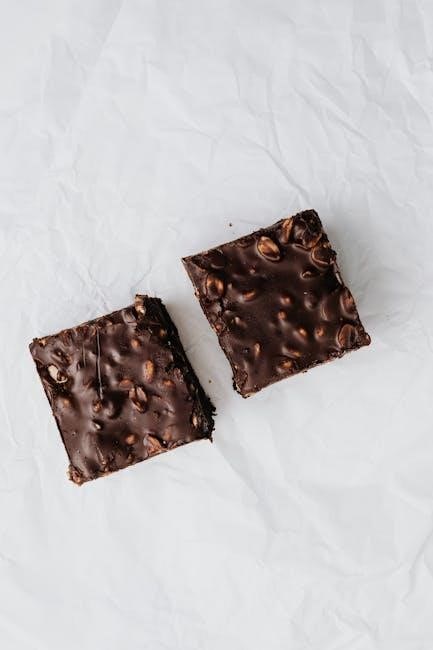Importance of a Balanced Diet
A balanced diet is crucial for breastfeeding mothers to ensure proper nutrition for both mother and baby. It supports milk production, replenishes nutrients, and aids in postpartum weight loss. Focus on protein, iron, calcium, and omega-3s to maintain energy and health. Staying hydrated is also essential for milk supply and overall well-being. Avoid restrictive diets to prevent nutrient deficiencies and maintain a healthy milk supply.

Setting Realistic Weight Loss Goals
Setting realistic weight loss goals is essential for breastfeeding mothers to ensure they lose weight safely without compromising their milk supply or overall health. Aiming for a gradual weight loss of 1-2 pounds per week is often recommended, as rapid weight loss can negatively impact milk production. Breastfeeding naturally burns approximately 500 calories per day, which already supports weight loss, but this varies among individuals.
It’s important to focus on a balanced diet and moderate physical activity rather than restrictive dieting; Losing 2-4 pounds per month is considered safe and unlikely to affect milk supply. However, losing more than 4-5 pounds per month (after the first month) is not advised, as it may deplete energy reserves and potentially reduce milk production.
Prioritizing nutrient-dense foods, staying hydrated, and avoiding extreme calorie restriction are key to maintaining both health and milk supply. Combining a healthy diet with regular, gentle exercise can enhance weight loss efforts without overexertion. Remember, weight loss after pregnancy is a gradual process, and consistency is more important than speed. Consulting a healthcare provider or nutritionist can also provide personalized guidance tailored to individual needs. By setting realistic and achievable goals, breastfeeding mothers can lose weight safely while nurturing their baby’s health.

Protein
Protein is a vital nutrient for breastfeeding mothers, playing a central role in the production of breast milk and overall health. It is essential for building and maintaining tissues, antibodies, and hormones, all of which are crucial for both the mother and the developing baby. Including high-quality protein sources in the diet ensures that breast milk contains adequate amounts of essential amino acids, which are vital for the baby’s growth and development.
Good sources of protein include lean meats like chicken and turkey, fish, eggs, dairy products, legumes, nuts, and seeds. For vegetarian or vegan mothers, plant-based proteins such as beans, lentils, tofu, and quinoa are excellent options. It is recommended to include protein in several meals throughout the day to maintain steady levels and support milk production. Additionally, protein helps with satiety, making it easier to manage weight loss goals by reducing hunger and preventing overeating.
Adequate protein intake also supports the mother’s recovery postpartum and helps maintain muscle mass, which is important for overall health and energy levels. Without sufficient protein, milk supply and quality may be affected, potentially impacting the baby’s nutrition. Therefore, prioritizing protein-rich foods in the diet is a key component of a healthy breastfeeding meal plan. By incorporating a variety of protein sources, breastfeeding mothers can ensure they are meeting their nutritional needs while supporting their baby’s health.
Iron
Iron is a critical nutrient for breastfeeding mothers, as it plays a key role in the production of red blood cells and helps maintain energy levels. During lactation, iron deficiency can lead to fatigue, which may impact milk supply and overall health. Breastfeeding mothers require adequate iron intake to support their own well-being and ensure their baby receives essential nutrients through breast milk.
Dietary sources of iron include lean meats like chicken, turkey, and beef, as well as fish and eggs. Plant-based sources such as beans, lentils, spinach, and fortified cereals are also excellent options. It is important to consume vitamin C-rich foods (e.g., citrus fruits, bell peppers) alongside iron-rich foods to enhance absorption.
Foods that inhibit iron absorption, such as tea, coffee, and calcium supplements, should be consumed separately from iron-rich meals. For example, drinking coffee with meals can significantly reduce iron absorption. Additionally, cooking in cast-iron cookware can help increase iron intake.
Breastfeeding mothers should aim to include a variety of iron-rich foods in their diet to meet their daily needs. If iron deficiency is suspected, consulting a healthcare provider for supplementation advice is recommended. Maintaining adequate iron levels not only supports the mother’s health but also ensures the baby receives the nutrients needed for proper growth and development.
Calcium and vitamin D are essential nutrients for breastfeeding mothers, as they support bone health for both the mother and the baby. During lactation, the body uses calcium to produce breast milk, which can deplete maternal bone stores if dietary intake is insufficient. Vitamin D is crucial for calcium absorption and plays a role in the baby’s bone development and immune system. Dairy products, such as milk, yogurt, and cheese, are excellent sources of calcium and vitamin D. Leafy green vegetables like kale and broccoli also provide calcium, while fatty fish like salmon and fortified cereals are rich in vitamin D. Sunlight exposure is another natural source of vitamin D, as the body synthesizes it upon exposure to UV rays. Breastfeeding mothers should aim to consume 1,000-1,200 mg of calcium daily, depending on age, and 600-800 IU of vitamin D. If dietary sources are inadequate, supplements may be necessary. It is important to maintain adequate levels of these nutrients to prevent bone density loss and ensure the baby receives sufficient amounts through breast milk. A well-balanced diet rich in calcium and vitamin D supports overall health and promotes optimal outcomes for both mother and child during the breastfeeding period. Consulting a healthcare provider or nutritionist can help tailor dietary needs to individual circumstances. Omega-3 fatty acids are essential for both breastfeeding mothers and their babies. These nutrients play a critical role in brain and eye development in infants, making them a vital component of a breastfeeding diet. Additionally, omega-3s support heart health and may reduce inflammation in the mother. Fatty fish such as salmon, sardines, and mackerel are rich in omega-3s, particularly DHA (docosahexaenoic acid), which is crucial for fetal brain development; Plant-based sources like flaxseeds, chia seeds, and walnuts also provide ALA (alpha-linolenic acid), a precursor to DHA. Including these foods in your diet ensures adequate omega-3 intake. For breastfeeding mothers aiming to lose weight, incorporating omega-3s can help with fat metabolism and may reduce cravings for unhealthy snacks. However, portion control is key, as fatty fish and nuts can be calorie-dense. A balanced intake of omega-3s supports overall health without hindering weight loss efforts. If dietary sources are insufficient, omega-3 supplements can be considered, but always consult a healthcare provider before starting any supplementation. Maintaining adequate omega-3 levels ensures optimal health benefits for both mother and baby while supporting a healthy weight loss journey. Staying hydrated is vital for breastfeeding mothers, as water makes up a significant portion of breast milk. Proper hydration supports milk production and overall health. Aim to drink plenty of water throughout the day, with herbal teas and clear broths also contributing to fluid intake. Limit caffeinated beverages, as they can interfere with milk supply and baby’s sleep. Similarly, sugary drinks should be avoided to prevent excessive calorie intake, which can hinder weight loss efforts. Instead, opt for water-rich foods like cucumbers, watermelon, and oranges to boost hydration levels naturally. Hydration also plays a role in weight loss by helping regulate metabolism and reducing hunger pangs. Even mild dehydration can slow down metabolic rates, making it harder to shed pounds. Drinking a glass of water before nursing or meals can help maintain energy levels and support a healthy weight loss journey. Avoid overhydration, as it can lead to discomfort and is unnecessary for milk supply. The general recommendation is 8-10 glasses of fluid daily, including water, teas, and milk. Carrying a reusable water bottle can serve as a helpful reminder to stay hydrated throughout the day. Breastfeeding mothers require a higher caloric intake to support milk production and energy needs. The recommended daily intake is generally between 1,500 to 1,800 calories, ensuring adequate nutrition for both mother and baby. This is approximately 300-500 calories more than the average non-breastfeeding woman, as breastfeeding burns extra calories. However, for weight loss, it’s essential to maintain a slight caloric deficit while avoiding extreme restrictions. A gradual weight loss of 1 pound per week is considered safe and healthy. Consuming nutrient-dense foods like whole grains, lean proteins, fruits, and vegetables ensures that the mother’s nutritional needs are met without excessive calorie intake. Portion control is key to managing caloric intake. Eating smaller, frequent meals throughout the day can help maintain energy levels and prevent overeating. It’s also important to focus on whole, unprocessed foods rather than relying on calorie-counting alone. By balancing calorie intake with physical activity, breastfeeding mothers can achieve their weight loss goals while preserving milk supply and overall health. Eating smaller, frequent meals throughout the day is highly recommended for breastfeeding mothers aiming to lose weight. This approach helps maintain energy levels, supports milk production, and prevents excessive hunger that can lead to overeating. Aim for 5-6 smaller meals instead of 3 large ones, spaced out every 2-3 hours. Starting the day with a nutritious breakfast is essential, followed by balanced snacks and meals. For example, a typical day might include oatmeal with fruits for breakfast, a mid-morning smoothie with protein and spinach, a grilled chicken salad for lunch, a yogurt with nuts as an afternoon snack, and a fish or lean meat dinner with vegetables. This pattern ensures consistent energy levels and prevents blood sugar spikes. Incorporating protein-rich snacks like nuts, hard-boiled eggs, or hummus can help control cravings and maintain satiety. Avoid skipping meals, as this can lead to fatigue and decreased milk supply. Instead, focus on nutrient-dense foods that provide both nourishment and satisfaction. By maintaining a regular meal schedule, breastfeeding mothers can support their weight loss goals while ensuring optimal health for themselves and their babies. Healthy snacking is a key component of a successful diet plan for breastfeeding mothers aiming to lose weight. Snacks provide essential nutrients, maintain energy levels, and prevent overeating during meals. Opt for nutrient-dense options like fruits, vegetables, nuts, seeds, and protein-rich foods. Fruits such as berries, apples, and bananas offer natural sweetness and fiber, while vegetables like carrots, cucumbers, and bell peppers provide vitamins and minerals. Nuts and seeds, including almonds, chia seeds, and pumpkin seeds, are excellent sources of healthy fats and protein. Pairing them with fruits or yogurt can enhance satisfaction. Protein-rich snacks like hard-boiled eggs, Greek yogurt, or a handful of trail mix support muscle repair and milk production. Whole grain crackers with avocado or hummus also make for a satisfying and nutritious choice. Avoid sugary or processed snacks, as they can lead to energy crashes and hinder weight loss efforts. Staying hydrated is equally important, so pair snacks with water or herbal teas to support digestion and milk supply. By choosing healthy snacks, breastfeeding mothers can maintain their energy levels, support their weight loss goals, and ensure they are providing the best nutrition for their babies. Portion control is essential for breastfeeding mothers aiming to lose weight while maintaining adequate nutrition. Eating smaller, balanced meals throughout the day helps manage calorie intake without compromising milk supply. Focus on nutrient-dense foods like lean proteins, whole grains, fruits, and vegetables, which provide satiety and essential nutrients. While portion control is important, it’s equally crucial to ensure you’re consuming enough calories to support milk production. Severe calorie restriction can negatively impact both energy levels and milk supply. Aim for gradual weight loss of 1-2 pounds per week by balancing calorie intake with physical activity. Incorporate a variety of foods to keep meals interesting and ensure you’re meeting your nutritional needs. Avoid skipping meals, as this can lead to overeating later in the day. Instead, plan snacks and meals in advance to maintain control over portion sizes. By focusing on quality and quantity, breastfeeding mothers can achieve their weight loss goals while maintaining a healthy milk supply. Safe exercises for postpartum mothers are essential for regaining strength, improving mental health, and supporting weight loss while breastfeeding. Gentle activities like walking, swimming, and yoga are ideal for the early weeks, as they promote healing without overexertion. Kegel exercises and pelvic floor workouts can help restore core strength and improve bladder control, which may weaken during pregnancy and childbirth. Postpartum exercises should focus on rebuilding abdominal muscles safely, avoiding high-impact movements that strain the body. Planks, modified crunches, and bird-dog exercises are effective for core recovery. Additionally, stretching routines can enhance flexibility and reduce muscle tension. It’s important to listen to your body and avoid overexertion, especially in the first few months. Consult with a healthcare provider before starting any new exercise program, especially if you had a cesarean section or complications during delivery. Breastfeeding mothers should wear supportive clothing, including a well-fitting sports bra, to ensure comfort during physical activity. Staying hydrated is also crucial, as exercise can increase fluid loss. Exercises that involve carrying or wearing your baby, such as babywearing walks, can be a fun and bonding way to stay active. Group fitness classes designed for postpartum mothers can provide community support and motivation. Regular physical activity not only aids in weight loss but also improves energy levels, mood, and overall well-being. By incorporating safe and gradual exercises into your routine, you can support your physical recovery and long-term health while breastfeeding. Regular exercise offers numerous benefits for breastfeeding mothers aiming to lose weight. It helps burn calories, tone muscles, and improve overall physical fitness. Exercise can enhance mood by releasing endorphins, which combat postpartum depression and anxiety. Additionally, physical activity boosts energy levels, which are often depleted during the postpartum period. Exercise supports the recovery of core strength, essential for carrying and caring for a baby. Activities like walking, swimming, and yoga are great for rebuilding strength without overexertion. Moreover, exercise can improve sleep quality, which is vital for new mothers. For breastfeeding mothers, exercise does not negatively impact milk supply if done moderately. In fact, staying active can help with weight loss while maintaining a healthy metabolism. Group fitness classes or home workouts provide an opportunity to connect with others, fostering a sense of community and motivation. It’s important to choose exercises that promote healing and avoid high-impact activities that strain the body; Over time, consistent physical activity can lead to long-term health benefits, such as improved cardiovascular health and stronger bones. Always consult a healthcare provider before starting a new exercise routine, especially after a cesarean or complicated delivery. Exercise is a powerful tool for both physical and mental well-being, helping mothers feel their best while caring for their baby.Calcium and Vitamin D
Omega-3 Fatty Acids

Hydration

Caloric Intake Needs
Meal Frequency
Healthy Snacking
Portion Control
Using smaller plates or measuring portions can help avoid overeating. Pay attention to hunger cues and stop when satisfied, rather than waiting until full. Avoid distractions like screens during meals, as they can lead to mindless snacking. Prioritize whole, unprocessed foods over pre-packaged snacks, which often contain hidden calories. 
Safe Exercises for Postpartum

Benefits of Exercise




